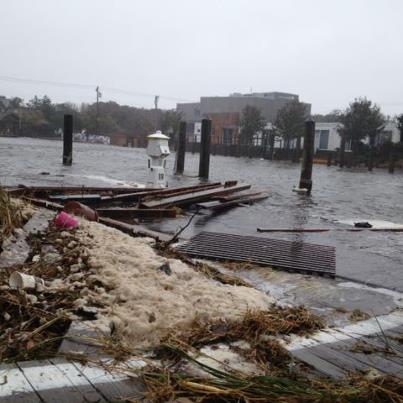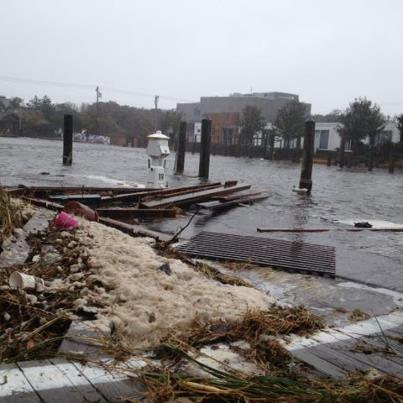National
Sandy inundates gay N.Y. beaches
Fire Island suffered widespread flooding during storm


The Great South Bay inundates the harbor in Fire Island Pines, N.Y., on Oct. 29 (Photo courtesy of Karen Boss)
Superstorm Sandy caused widespread damage to New York’s Fire Island on Monday as it approached the Eastern Seaboard.
The National Weather Service reported seven homes in Davis Park, which is Fire Island’s easternmost community, washed out to sea during high tide on Monday night. A firefighter in Ocean Beach, a village with roughly 150 year-round residents to the west of the gay resorts of Cherry Grove and Fire Island Pines, told the Washington Blade the storm damaged or destroyed up to 40 oceanfront homes.
“There are confirmed reports of houses lost to the ocean elsewhere on Fire Island, but none in the Pines,” said the Fire Island Pines Property Owners Association in an e-mail it sent to local property owners on Tuesday.
FIPPOA further noted it has “confirmed reports” of “extensive washovers from the ocean” in the eastern part of the hamlet and a “very severe breach from the ocean to the bay just east of the Pines.” The group also noted oceanfront homes experienced “extensive damage” to pools and decks.
“We know that there is extensive flooding from the bay and the ocean and the bay is experiencing very high tides at this time,” said FIPPOA. “Our dunes are destroyed along the length of the community.”
“We are the only community on fire island without catastrophic damage,” reads the message.
Suffolk County officials on Saturday ordered a mandatory evacuation of Fire Island, which is only accessible by ferries and private boats, on Saturday.
The year-round population of the 34-mile long barrier island east of New York City is less than 500, but can swell to as many as 30,000 during the summer.
Cherry Grove resident Ken Woodhouse told the Blade from his Peekskill, N.Y., home at least 75 people took a Sunday morning ferry from the beach to Sayville across the Great South Bay on Long Island. Local media reports indicate police rescued 14 people on western Fire Island who defied the evacuation order.
Karen Boss, who lives in the Pines year-round with her husband, told CNN’s Wolf Blitzer on Monday afternoon the bay had completely submerged the hamlet’s harbor during high tide. A video she posted to her Facebook page showed waves crashing over bay front bulkheads.
Boss told the Blade in an e-mail earlier on Tuesday the storm surge flooded her bay front home last night. She also reported high winds also toppled trees and power lines.
“I have never experienced it this bad,” said Boss.
It is not immediately clear whether the Sip n’ Twirl nightclub and other local businesses rebuilt after a fire destroyed them nearly a year ago suffered any damage. Construction crews recently began rebuilding the adjacent Pavilion nightclub destroyed during the same Nov. 2011 blaze. Co-owner Andrew Kirtzman could not immediately confirm to the Blade whether Sandy caused any damage to the site.
Woodhouse reported the storm surge lifted Bay View Walk in Cherry Grove nearly a foot. He said the water did not enter his bay front house.
“We’re right on the bay, and she’s dry as a bone,” said Woodhouse.
Minnesota
Tim Walz drops out of Minn. governor’s race
The longtime LGBTQ ally and Democratic party figure blames ongoing fraud investigations supported by Trump and the GOP for his withdrawal.

Minnesota Gov. Tim Walz announced Monday that he is withdrawing from the 2026 Minnesota governor’s race, citing what he described as political interference and attacks from Republican Party leaders.
Walz made the announcement on social media, where the post quickly gained traction, drawing more than 30,000 likes on Instagram and 23,000 reactions on Facebook.
In his statement, the incumbent governor directly blamed former President Donald Trump and his allies, both in Washington and in Minnesota, for fueling what he characterized as politically motivated accusations of widespread fraud tied to federal nutrition programs in the state.
According to a 2024 ABC News story, more than 70 people have been charged as part of a “wide-ranging criminal conspiracy” that allegedly exploited two federally funded nutrition programs during the COVID-19 pandemic, resulting in more than $250 million in fraudulent claims.
“I won’t mince words here,” Walz wrote. “Donald Trump and his allies — in Washington, in St. Paul, and online — want to make our state a colder, meaner place. They want to poison our people against each other by attacking our neighbors. And, ultimately, they want to take away much of what makes Minnesota the best place in America to raise a family.”
In his announcement, Walz also cited recent reports from Somali American child care center operators in Minnesota who said they have faced violent threats and vandalism after right-wing YouTuber Nick Shirley posted a video alleging fraud at their facilities. Following the video’s release, the Trump-Vance administration cut federal child care funding nationwide.
Walz also criticized the federal government’s decision to withhold child care funding from states amid the allegations.
“They’ve already begun by taking our tax dollars that were meant to help families afford child care,” he added. “And they have no intention of stopping there.”
Last week, a Department of Health and Human Services official confirmed that the Trump administration is pausing child care funding to all states following the Minnesota allegations, stating that funds will be released “only when states prove they are being spent legitimately.”
“Republicans are playing politics with the future of our state,” Walz said. “And it’s shameful.”
Walz previously served as the Democratic vice presidential nominee alongside then–Vice President Kamala Harris during her unsuccessful 2024 presidential campaign.
Meanwhile, longtime Trump ally and MyPillow CEO Mike Lindell announced in December that he is running for Minnesota governor and has already received Trump’s endorsement.
Walz has been a longtime ally of the LGBTQ community, dating back to 1999, when he served as a football coach and teacher at Mankato West High School in Mankato, Minnesota, about 80 miles southwest of Minneapolis.
It is also possible that U. S. Sen. Amy Klobuchar (D-Minn.) is considering entering the race to succeed him.
National
Top 10 LGBTQ national news stories of 2025
Trump, Supreme Court mount cruel attacks against trans community

President Trump’s anti-LGBTQ agenda dominated national news in 2025, particularly his cruel attacks on trans Americans. Here are our picks for the top 10 LGBTQ news stories the Blade covered in 2025.
10. Trump grants clemency to George Santos

President Donald Trump granted clemency to disgraced former Long Island Rep. George Santos. Santos was sentenced to 87 months in federal prison after pleading guilty to wire fraud and aggravated identity theft and had served just 84 days of his more than seven-year sentence. He lied to both the DOJ and the House Ethics Committee, including about his work and education history, and committed campaign finance fraud.
9. U.S. Olympics bans trans women athletes
The United States Supreme Court decided in 2025 to take up two cases — Little v. Hecox and West Virginia v. B.P.J.— both of which concern the rights of transgender athletes to participate on sports teams. The cases challenge state laws under the Equal Protection Clause of the 14th Amendment, which prevents states from offering separate boys’ and girls’ sports teams based on biological sex determined at birth. Both cases are set to be heard in January 2026. The developments follow a decision by the United States Olympic & Paralympic Committee to change eligibility rules to prohibit transgender women from competing in women’s sporting events on behalf of the United States, following Trump’s Executive Order 14201, “Keeping Men Out of Women’s Sports.”
8. FDA approves new twice-yearly HIV prevention drug
The U.S. Food and Drug Administration on June 18 approved a newly developed HIV/AIDS prevention drug that needs to be taken only twice a year, with one injection every six months. The new drug, lenacapavir, is being sold under the brand name Yeztugo by pharmaceutical company Gilead Sciences. According to trial data, 99.9 percent of participants who received Yeztugo remained HIV negative. This emerging technology comes amid direct cuts to HIV/AIDS research measures by the Trump–Vance administration, particularly targeting international HIV efforts such as PEPFAR.
7. LGBTQ people ‘erased’ from gov’t reports
Politico reported in March that the Trump–Vance administration is slashing the State Department’s annual human rights report, cutting sections related to the rights of women, people with disabilities, the LGBTQ+ community, and more. Members of Congress objected to the removal of the subsection on “Acts of Violence, Criminalization, and Other Abuses Based on Sexual Orientation, Gender Identity or Expression, or Sex Characteristics (SOGIESC)” from the State Department’s Annual Country Reports on Human Rights Practices.
In a Sept. 9 letter to Secretary of State Marco Rubio, U.S. Reps. Robert Garcia (D-Calif.), Julie Johnson (D-Texas), and Sarah McBride (D-Del.) urged the department to restore the information or ensure it is integrated throughout each report, noting that the reports serve as key evidence for asylum seekers, attorneys, judges, and advocates assessing human rights conditions and protection claims worldwide.
6. Trump admin redefines ‘sex’ in all HHS programs

The Trump administration canceled more than $800 million in research into the health of sexual and gender minority groups. More than half of the National Institutes of Health grants scrapped through early May involved studies of cancers and viruses that disproportionately affect LGBTQ people.
The administration is also pushing to end gender-affirming care for transgender youth, according to a new proposal from the Department of Health and Human Services, NPR reported. The administration is considering blocking all Medicaid and Medicare funding for services at hospitals that provide pediatric gender-affirming care. “These rules would be a significant escalation in the Trump administration’s attack on access to transgender health care,” said Katie Keith, director of the Center for Health Policy and Law at Georgetown University.
5. FBI plans to label trans people as ‘violent extremists’
The Human Rights Campaign, Transgender Law Center, Equality Federation, GLAAD, PFLAG, and the Southern Poverty Law Center condemned reports that the FBI, in coordination with the Heritage Foundation, may be working to designate transgender people as “violent extremists.” The concerns followed a report earlier this month by independent journalist Ken Klippenstein, who cited two anonymous national security officials saying the FBI is considering treating transgender subjects as a subset of a new threat category.
That classification—originally created under the Biden administration as “Anti-Authority and Anti-Government Violent Extremists” (AGAAVE) — was first applied to Jan. 6 rioters and other right-wing extremists. Advocates said the proposal appears to stem from the false claim that the assassination of Charlie Kirk was committed by a transgender person.
4. Pentagon targets LGBTQ service members

Acting in agreement with the growing anti-LGBTQ sentiment from the Trump administration, during a televised speech to U.S. military leaders at Marine Corps Base Quantico in late September, Defense Secretary Pete Hegseth denounced past military leadership for being too “woke,” citing DEI initiatives and LGBTQ inclusion within the Department of Defense. During the 45-minute address, Hegseth criticized inclusive policies and announced forthcoming directives, saying they would ensure combat requirements “return to the highest male standard only.”
Since 2016, a Navy replenishment oiler had borne the name of gay rights icon Harvey Milk, who served in the Navy during the Korean War and was separated from service under other than honorable conditions due to his sexuality before later becoming one of the first openly LGBTQ candidates elected to public office. In June 2025, the ship was renamed USNS Oscar V. Peterson.
The U.S. Air Force also announced that transgender service members who have served between 15 and 18 years would be denied early retirement and instead separated from the military without benefits. Transgender troops will be given the option of accepting a lump-sum payout offered to junior service members or being removed from service.
In February, the Pentagon said it would draft and submit procedures to identify transgender service members and begin discharging them from the military within 30 days.
3. Trump blames Democrats, trans people for gov’t shutdown
Republicans failed to reach an agreement with Democrats and blamed them for the government shutdown, while Democrats pointed to Republicans for cutting health care tax credits, a move they said would result in millions of people paying significantly higher monthly insurance premiums next year. In the White House press briefing room, a video of Democrats discussing past government shutdowns played on a loop as the president continued to blame the Democratic Party and “woke” issues, including transgender people.
“A lot of good can come from shutdowns. We can get rid of a lot of things. They’d be Democrat things,” Trump said the night before the shutdown. “They want open borders. Men playing in women’s sports. They want transgender for everybody.”
2. Supreme Court joins attacks on LGBTQ Americans

The U.S. Supreme Court issued multiple rulings this year affecting LGBTQ people. In Mahmoud v. Taylor (6–3), it ruled that public schools must give parents advance notice and the option to opt children out of lessons on gender or sexuality that conflict with their religious beliefs. The case arose after Montgomery County, Md., schools added LGBTQ-inclusive storybooks to the elementary curriculum.
In June, the court upheld Tennessee’s ban on gender-affirming care for transgender minors, protecting similar laws in more than 20 states. Lawmakers and advocates criticized the ruling, and a coalition of seven medical associations warned it strips families of the right to direct their own health care.
The Court also allowed the Trump administration to enforce a ban on transgender military personnel and to implement a policy blocking passports with “X” gender markers, with the federal government recognizing only male and female designations.
1. Trump inaugurated for second time
President Donald Trump became the 47th president after winning Wisconsin, securing 277 of the 270 electoral votes needed. His guidebook, Project 2025, outlined the Republican Party’s goals under his new leadership, with a particular focus on opposing transgender rights.
Trump nominated openly gay hedge fund executive Scott Bessent as U.S. Treasury Secretary, a role he eventually assumed. Bessent became the highest-ranking openly gay U.S. government official in American history.

Honorable mention: The war on rainbow crosswalks escalates around the country
Florida Gov. Ron DeSantis (R) ordered state transportation officials to remove a rainbow-colored crosswalk in Orlando next to the Pulse gay nightclub, where 49 mostly LGBTQ people were killed in a 2016 mass shooting. The move follows a July 1, 2025, announcement by U.S. Transportation Secretary Sean Duffy that, with support from President Trump, the department adopted a “nationwide roadway safety initiative” that political observers say could be used to require cities and states to remove rainbow street crosswalks.
Federal Government
Holiday week brings setbacks for Trump-Vance trans agenda
Federal courts begin to deliver end-of-year responses to lawsuits involving federal transgender healthcare policy.

While many Americans took the week of Christmas to rest and relax, LGBTQ politics in the U.S. continued to shift. This week’s short recap of federal updates highlights two major blows to the Trump-Vance administration’s efforts to restrict gender-affirming care for minors.
19 states sue RFK Jr. to end gender-affirming care ban
New York Attorney General Letitia James announced on Tuesday that the NYAG’s office, along with 18 other states (and the District of Columbia), filed a lawsuit to stop U.S. Health and Human Services (HHS) Secretary Robert F. Kennedy Jr. from restricting gender-affirming care for minors.
In the press release, Attorney General James stressed that the push by the Trump-Vance administration’s crusade against the transgender community — specifically transgender youth — is a “clear overreach by the federal government” and relies on conservative and medically unvalidated practices to “punish providers who adhere to well-established, evidence-based care” that support gender-affirming care.
“At the core of this so-called declaration are real people: young people who need care, parents trying to support their children, and doctors who are simply following the best medical evidence available,” said Attorney General James. “Secretary Kennedy cannot unilaterally change medical standards by posting a document online, and no one should lose access to medically necessary health care because their federal government tried to interfere in decisions that belong in doctors’ offices. My office will always stand up for New Yorkers’ health, dignity, and right to make medical decisions free from intimidation.”
The lawsuit is a direct response to HHS’ Dec. 18 announcement that it will pursue regulatory changes that would make gender-affirming health care for transgender children more difficult, if not impossible, to access. It would also restrict federal funding for any hospital that does not comply with the directive. KFF, an independent source for health policy research, polling, and journalism, found that in 2023 federal funding covered nearly 45% of total spending on hospital care in the U.S.
The HHS directive stems directly from President Donald Trump’s Jan. 28 Executive Order, Protecting Children From Chemical and Surgical Mutilation, which formally establishes U.S. opposition to gender-affirming care and pledges to end federal funding for such treatments.
The American Medical Association, the nation’s largest and most influential physician organization, has repeatedly opposed measures like the one pushed by President Trump’s administration that restrict access to trans health care.
“The AMA supports public and private health insurance coverage for treatment of gender dysphoria and opposes the denial of health insurance based on sexual orientation or gender identity,” a statement on the AMA’s website reads. “Improving access to gender-affirming care is an important means of improving health outcomes for the transgender population.”
The lawsuit also names Oregon, Washington, California, Colorado, Connecticut, Delaware, the District of Columbia, Illinois, Maine, Maryland, Massachusetts, Michigan, Minnesota, New Mexico, Pennsylvania, Rhode Island, Vermont, and Wisconsin as having joined New York in the push against restricting gender-affirming care.
At the HHS news conference last Thursday, Jim O’Neill, deputy secretary of the department, asserted, “Men are men. Men can never become women. Women are women. Women can never become men.”
DOJ stopped from gaining health care records of trans youth
U.S. District Judge Cathy Bissoon blocked an attempt by the Department of Justice (DOJ) to gain “personally identifiable information about those minor transgender patients” from the University of Pittsburgh Medical Center (UPMC), saying the DOJ’s efforts “fly in the face of the Supreme Court.”
Journalist Chris Geidner originally reported the news on Dec. 25, highlighting that the Western District of Pennsylvania judge’s decision is a major blow to the Trump-Vance administration’s agenda to curtail transgender rights.
“[T]his Court joins the others in finding that the government’s demand for deeply private and personal patient information carries more than a whiff of ill intent,” Bissoon wrote in her ruling. “This is apparent from its rhetoric.”
Bissoon cited the DOJ’s “incendiary characterization” of trans youth care on the DOJ website as proof, which calls the practice politically motivated rather than medically sound and seeks to “…mutilate children in the service of a warped ideology.” This is despite the fact that a majority of gender-affirming care has nothing to do with surgery.
In United States v. Skrmetti, the Supreme Court ruled along party lines that states — namely Tennessee — have the right to pass legislation that can prohibit certain medical treatments for transgender minors, saying the law is not subject to heightened scrutiny under the Equal Protection Clause of the Fourteenth Amendment because it does not involve suspect categories like race, national origin, alienage, and religion, which would require the government to show the law serves a compelling interest and is narrowly tailored, sending decision-making power back to the states.
“The government cannot pick and choose the aspects of Skrmetti to honor, and which to ignore,” Judge Bissoon added.
The government argued unsuccessfully that the parents of the children whose records would have been made available to the DOJ “lacked standing” because the subpoena was directed at UPMC and that they did not respond in a timely manner. Bissoon rejected the timeliness argument in particular as “disingenuous.”
Bissoon, who was nominated to the bench by then-President Obama, is at least the fourth judge to reject the DOJ’s attempted intrusion into the health care of trans youth according to Geidner.




















